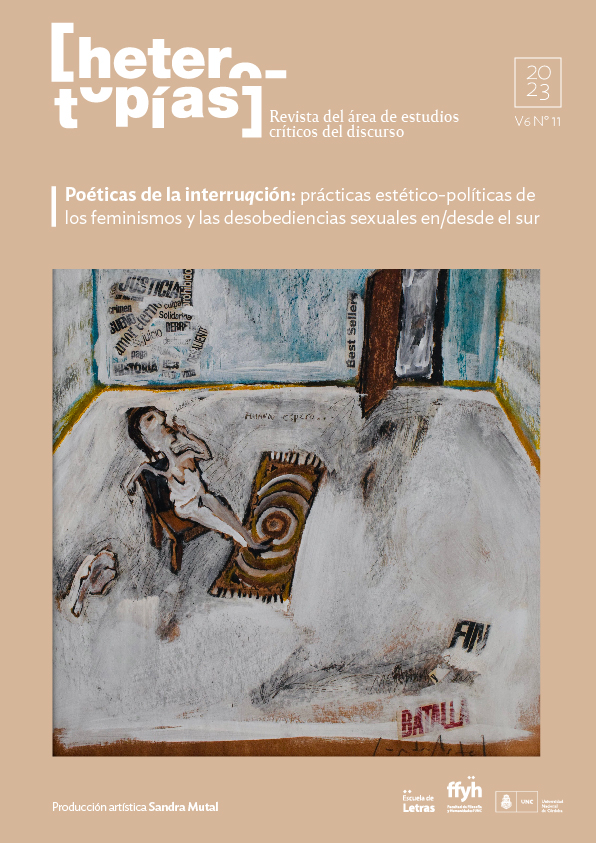Invoke the archive Writing the impossible from the south Escribir lo imposible desde el sur
Main Article Content
Abstract
This article proposes to think about a queer affective archive from the categories of the affective turn and deconstruction. We consider that archiving is a political gesture and the archive concept supposes a theory of cultural relevance, in which different forms of narrative economy come into play. We start from a situated thought [dis/oriented to the south] and the ways in which we can read the texts that build identities. In this invocation of an affective archive. We are interested in thinking about the word count both in the sense of counting as a narrative, and in what counts for its value to ask us: How the affective ties of queer/lesbian life are counted? in two novels La insumisa de Cristina Peri Rossi (2022) y En la casa de los sueños (2022) de Cármen María Machado. We maintain that the narrative economy constructs differential ways of telling stories that deviate from the heterocisexual norm and that escape from the institutionalized forms of the archive. We cros over the archive concepts of Jacques Derrida, Anne Cvetkovich and José Esteban Muñoz to put into play that queer archives can be read as a deconstructed archive, that is, as a constellation of ephemeral traces, insofar as they are and are not a presence.
Downloads
Article Details

This work is licensed under a Creative Commons Attribution-NonCommercial-ShareAlike 4.0 International License.
Those authors who have publications with this journal, accept the following terms: Those authors who have publications with this journal, accept the following terms:
a. The authors will keep their copyright and guarantee to the journal the right of first publication of their work, which will be simultaneously subject to the Creative Commons Attribution - Non-Commercial - Share Alike (by-nc-sa) Attribution License; no commercial use of the original work or any derivative works is allowed, the distribution of which must be done with a license equal to the one that regulates the original work.
b. Authors may adopt other non-exclusive license agreements for the distribution of the published version of the work (e.g., deposit it in an institutional telematic archive or publish it in a monographic volume) provided that the initial publication in this journal is indicated.
c. Authors are allowed and recommended to disseminate their work through the Internet (e.g. in institutional telematic archives or on their website) before and during the submission process, which may lead to interesting exchanges and increase the number of citations of the published work. (See The effect of open access).
How to Cite
References
Ahmed, Sara (2016) “Fragilidad queer”. 452(f). Notas críticas. Revista de Teoría de la Literatura y Literatura comparada.
Allison, Dorothy (2020) El sexo y la escritura. Ediciones Precarias. Neuquén
Butler, Judith (2007) El género en disputa. El feminismo y la subversión de la identidad. Paidós. Barcelona.
Cvetkovich, Anne (2018) Un archivo de sentimientos. Trauma, sexualidad y culturas públicas lesbianas. Bellaterra. Barcelona
Dahbar, Victoria (2021) Otras figuraciones. Sobre la violencia y sus marcos temporales. Ed. Asentamiento Fernseh. Córdoba
Derrida, J. (1997) Mal de archivo. Una impresión freudiana. Trotta. Madrid
—. (1998) Espectros de Marx. El estado de la deuda, el trabajo del duelo y la Nueva Internacional. Trotta. Madrid
—. (2005) La verdad en pintura. Paidós. Buenos Aires
flores, val (2021) Romper el corazón del mundo. Continta Me Tienes. Madrid
—. (2017) Interruqciones. Editorial Asentamiento Fernseh. Córdoba.
Halberstam, Jack (2018) El arte queer del fracaso. Egales. Madrid
Love, Heather (2007). Feeling Backward. Loss and the Politics of Queer History. Cambridge & London: Harvard University Press. “Introducción” traducida por Lucas Morgan Disalvo https://docer.com.ar/doc/neecnnx
Machado, Cármen María (2022) En la casa de los sueños. Ed. Anagrama. Buenos Aires
Muñoz, J. E. (2020) Utopía queer. Caja Negra Ed. Buenos Aires
—. (2022) “Lo efímero como evidencia. Notas introductorias a los actos queer”. Introducción y traducción por Constanza San Pedro y Magalí Herranz “La traducción como lectura. Epistemología queer en José Esteban Muñoz”. Revista Transas Letras y artes de América Latina.
https://www.revistatransas.com/2022/12/29/munoz-efimero-sanpedro-herranz/#sdendnote1sym
Peri Rossi, Cristina (2022) La insumisa. Editorial Menoscuarto. Argentina
